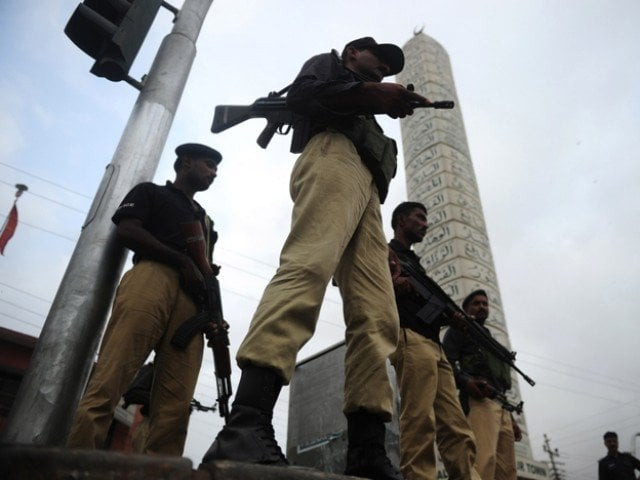‘Vulnerable’ establishments: Sindh’s new bill can make any place ‘sensitive’
Law allows authorities to shut down any ‘vulnerable’ establishment until it improves its security.

PHOTO: REUTERS
The Sindh Assembly on Friday passed a bill to make arrangements for the security of vulnerable establishments that, according to the bill, can include anything from places of worship to banks and parks.
Provincial parliamentary affairs minister Dr Sikandar Mandhro stated that the bill was being passed in pursuance of the implementation of the National Action Plan. The Sindh Security of Vulnerable Establishments Bill covers sensitive places, which include schools, hospitals, places of worship, non-governmental organisations, foreign projects, banks, moneychangers, industrial units and parks among others.
According to this bill, a security advisory committee will be formed by the deputy commissioner in each sub-division of the province. These committees will be headed by sub-divisional police officers, while representatives of the district administration, Special Branch, Counter-Terrorism Department, traders and farmers will be the other members.
Each committee will identify sensitive places, recommending them for notifications to be issued by the relevant deputy commissioner. It will also advise the in-charges of the vulnerable establishments about security arrangements as necessary. The members of the committee will further send a report to the head of the district police in case of non-compliance with its advice.
According to the bill, it is mandatory for the area SHO to inspect the vulnerable places, as declared by the security advisory committee, and submit reports about them to the district police officer. The law further says, "If any organisation fails to implement the advice of the committee within the stipulated time, the committee may direct officials to completely or partially seal it until satisfactory security arrangements are made." The organisation can appeal against the sealing or suspension of its operations before the area DIG within three days, it added.
Anyone who knowingly contravenes the law is liable to be imprisoned for up to six months; no suit, prosecution or other legal proceedings can be initiated against the committee's decision.
Water woes
The Sindh Assembly also unanimously passed a resolution against the Indus River System Authority's (Irsa) decision to open the irrigation water supply to the Chashma-Jhelum (CJ) link canal in violation of an inter-province agreement. The lawmakers demanded that the supply be suspended forthwith unless Sindh gave its consent.
"It is a non-perennial canal that can only be operated in the flood season with the Sindh's consent," stated senior minister Nisar Ahmed Khuhro while moving the resolution. "Unfortunately, the Punjab government violates the agreement by opening up the canal all year." He added that they would take up this issue in an upcoming Council of Common Interest meeting.
Referring to a recent meeting between the federal government and Irsa, Khuhro said that they had decided to release 8,000 cusecs to the canal, against the agreement inked in 1972, which only allows for the release of water in the flood and monsoon season after Sindh's requirements are fulfilled.
Provincial finance minister Murad Ali Shah, who has previously served as the Sindh irrigation minister, pointed out that the water accord of 1991 was also imposed upon the province. "In this accord, the Greater Thal Canal Project was introduced to get 3,400 cusecs from the River Indus," he explained, adding that the federal government had also decided to release more water into the Tarbela Dam.
Shah claimed that Punjab, Balochistan and Khyber-Pakhtunkhwa had always supported Irsa's unilateral decisions. "During the Pakistan Peoples Party's five-year term in federal government, we managed this crisis amicably by closing the CJ link canal but the Pakistan Muslim League-Nawaz government has revised its past stance."
The Sindh Service Tribunals (Second Amendment) Bill was also introduced in order to appoint the chairpersons and members of tribunals in consultation with the Sindh High Court chief justice.
Published in The Express Tribune, April 18th, 2015.


















COMMENTS
Comments are moderated and generally will be posted if they are on-topic and not abusive.
For more information, please see our Comments FAQ